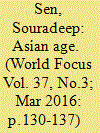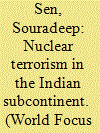| Srl | Item |
| 1 |
ID:
144001


|
|
|
|
|
| Summary/Abstract |
India and Japan have shared a close relationship for a very long time. With the introduction of Buddhism in Japan in the sixth century, exchanges were believed to have started between the two nations. Buddhism brought hues of Indian culture to Japan and the process of cultural exchanges began. After the Second World War, the two countries signed a peace accord and established formal diplomatic relations in April 1952.
|
|
|
|
|
|
|
|
|
|
|
|
|
|
|
|
| 2 |
ID:
145918


|
|
|
|
|
| Summary/Abstract |
With the end of the Cold War the international scenario changed putting end to the erstwhile Cold War ‘brinkmanship’. It ushered in flexibility and openness. It soon became obvious that the neo-realist theory was not at all clear about the future developments of the ‘balance of power’. The older debates were replaced with two new debates: one between ‘rationalists’ and ‘constructivists’ and the other between ‘constructivists’ and ‘critical theorists’. Although some scholars opine that the historical context (the end of Cold War) and the theoretical discussion among IR scholars set the stage for a constructivist approach, it would be more correct to argue that the catalyst for this shift in the axes of debate was the rise of a new constructivist approach to international relations theory.3 This approach challenged the rationalism and positivism of neo-realism and neo-liberalism while simultaneously pushing critical theorists away from meta-theoretical critique to the empirical analysis of world politics.
|
|
|
|
|
|
|
|
|
|
|
|
|
|
|
|
| 3 |
ID:
144016


|
|
|
|
|
| Summary/Abstract |
To revamp the theoretical debate stated in the paper, realism as a theory of International Relations stresses on the importance of power in the international arena, which it considers anarchic and based on self-help of states. In such a situation, it is every state for itself. On the other hand liberalism espouses the use of reason in the international arena for the realization of peace and justice; it holds that democratic countries have pacific international relations and most importantly that free trade would create a more peaceful international order. Realities of the Indo-Pakistani conflict dyad show how far the progressive theories of liberalism have been undermined.
|
|
|
|
|
|
|
|
|
|
|
|
|
|
|
|
| 4 |
ID:
143056


|
|
|
|
|
| Summary/Abstract |
Terrorism is a term with no agreed definition among governments or academicians, but is almost used exclusively in a pejorative sense, to describe life-threatening actions perpetrated by politically motivated self-appointed sub-state groups. A more accurate definition has been proffered by the International Institute for Strategic Studies, London: terrorism is the use of violence, often against people not directly involved in a conflict, by groups operating clandestinely, which generally claim to have high political or religious purposes, and believe that creating a climate of terror will assist attainment of their objectives.
|
|
|
|
|
|
|
|
|
|
|
|
|
|
|
|